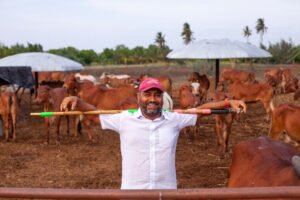Wednesday, 18 February 2026
Unlocking nature’s super protein: Australian partnership targets scalable human lactoferrin
Siobhan Coster, CEO, Eclipse Ingredients In a groundbreaking development for Australia’s health and biotechnology sectors, Brisbane-based Eclipse Ingredients is partnering with QUT, UQ, and CSIRO to commercialise human lactoferrin using…

Siobhan Coster, CEO, Eclipse Ingredients
In a groundbreaking development for Australia’s health and biotechnology sectors, Brisbane-based Eclipse Ingredients is partnering with QUT, UQ, and CSIRO to commercialise human lactoferrin using precision fermentation. This collaboration aims to unlock one of nature’s most powerful yet previously inaccessible proteins. Supported by a $5.5 million co-investment from the national Food and Beverage Accelerator (FaBA), the partnership intends to produce scalable, high-purity human lactoferrin for applications in functional foods, sports nutrition, and skincare products. In an interview with NUFFOODS Spectrum, CEO Siobhan Coster explained that this innovation could revolutionise global health products by offering a sustainable and effective alternative to traditionally dairy-derived lactoferrin.
What inspired QUT and its partners to focus on commercialising human lactoferrin through precision fermentation?
The inspiration came from Eclipse recognising a fundamental problem in the health industry – human lactoferrin is one of nature’s most powerful proteins, with an incredible breadth of functionality, yet it’s been virtually impossible to access. Traditional lactoferrin extraction is from cow’s milk and requires 10,000 litres to produce just 1kg, making it unsustainable and difficult to scale. Moreover, it’s also structurally different from what human bodies naturally make and recognise.
What makes lactoferrin particularly exciting is that it’s a genuine win-win – significant health potential with compelling economics. Because it’s effective in small amounts, we can create products that genuinely transform health outcomes with economics that really stack up.
What have been the biggest scientific or technical challenges in producing human lactoferrin at scale, and how have you overcome them?
While scientists have understood for decades how to get yeasts to make proteins through fermentation, every protein comes with different challenges. Human lactoferrin requires synergistic innovation across microbial strain engineering, precision fermentation methods, and bioprocess development.
One of the biggest challenges is achieving production yields that make economic sense for consumer products. That’s why lactoferrin is our flagship ingredient – it’s high-value and works in small doses. Our expert team is focused on technical outcomes needed to achieve commercial viability.
How does the partnership with Eclipse Ingredients enhance the scalability and commercial potential of this innovation?
This partnership is game-changing for Eclipse. By leveraging existing world-class infrastructure and expertise at QUT, UQ and CSIRO, we stay capital-efficient, rather than building infrastructure that would cost us tens of millions. That means we can remain laser-focused on what matters – our people, our patents and breakthrough science.
Most importantly, we can prove commercial viability much faster, with QUT’s pilot-scale capabilities allowing us to demonstrate our technology works at meaningful production volumes, not just in laboratory flasks.
In what ways could human lactoferrin transform the functional food, sports nutrition, and skincare industries?
The transformation comes from finally connecting proven science with practical applications – we have decades of research on lactoferrin’s benefits across immune and microbiome support, iron absorption, and anti-inflammatory properties, but until now, products simply couldn’t access it.
What’s exciting is that we’re changing that, and the applications are, honestly, near-endless. We’re talking about functional foods that can actually boost immunity, sports nutrition that delivers real performance benefits, and infant formula that gets us closer to the gold standard of breastmilk.
What role does the $5.5 million co-investment from FaBA play in accelerating the development and market-readiness of this protein?
This funding is about speed to market and competitive positioning. The $5.5 million allows us to accelerate our development timeline significantly – we can move to pilot-scale production and commercial partnerships years earlier than if we had to build these capabilities ourselves.
What’s particularly valuable is that we maintain full oversight and control of our processes while accessing world-class facilities. We’re working hand-in-hand with leading research institutions rather than outsourcing our development. In biotech, timing is everything, but so is maintaining control of your IP and processes.
Looking ahead, what are the next milestones or commercial goals for this project in the next 12–24 months?
Our primary goal is to bring our first product to market in 2027, starting with skincare applications. Over the next 12-24 months, we’ll be leveraging this partnership to optimise our production processes and complete the validation work needed for commercialisation. The pilot-scale capabilities we’re developing through this collaboration will be crucial for demonstrating that we can deliver the quality and consistency customers need.
Shraddha Warde
shraddha.warde@mmactiv.com
Technology
Carlsberg Launches AI-Crafted Lunar New Year Packaging
Feb 17, 2026 | Beverages
FAO Experts Assess Risk of Antimicrobial Resistance Spreading via Food Loss and Waste
Feb 17, 2026 | Sustainability
Food Testing
Redefining Trust in Organic Foods through Independent Testing
Feb 13, 2026 | Food Safety and Testing
AFNOR International Eyes Global Food Safety Growth with HACCP Group Takeover
Feb 04, 2026 | Australia
More Popular
Hormel Foods Announces Agreement to Sell Whole-Bird Turkey Business to Life-Science Innovations
Feb 18, 2026 | Company News
Kodiak Expands Frozen Lineup with No Sugar Added Homestyle Power Waffles
Feb 18, 2026 | Company News






